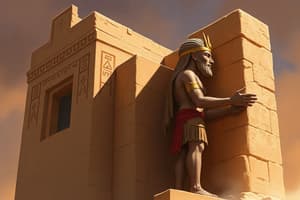Podcast
Questions and Answers
Which of the following was NOT a responsibility of the nobles in ancient Egypt?
Which of the following was NOT a responsibility of the nobles in ancient Egypt?
- Collecting taxes
- Enforcing the pharaoh's orders
- Interpreting the will of the gods (correct)
- Ruling the provinces
What was the primary role of scribes in ancient Egyptian society?
What was the primary role of scribes in ancient Egyptian society?
- Ruling provinces and collecting taxes
- Writing official documents and managing taxes (correct)
- Controlling the army and defending borders
- Leading religious ceremonies and rituals
Which group in ancient Egypt was responsible for protecting the borders of the empire?
Which group in ancient Egypt was responsible for protecting the borders of the empire?
- The army (correct)
- The priests
- The nobles
- The scribes
What made the position of scribe a privileged one in ancient Egyptian society?
What made the position of scribe a privileged one in ancient Egyptian society?
What was NOT a trade good that Hatshepsut's expedition brought back from Punt?
What was NOT a trade good that Hatshepsut's expedition brought back from Punt?
What was unusual about Hatshepsut's reign as pharaoh?
What was unusual about Hatshepsut's reign as pharaoh?
What happened to many of Hatshepsut's sculptures after her death?
What happened to many of Hatshepsut's sculptures after her death?
Which of the following best describes the relationship between priests and temples in ancient Egypt?
Which of the following best describes the relationship between priests and temples in ancient Egypt?
Flashcards
What was the role of the pharaoh?
What was the role of the pharaoh?
The pharaoh was the supreme ruler of Ancient Egypt. They were seen as a god-king with absolute power over the land and its people.
Who were the nobles?
Who were the nobles?
Nobles were high-ranking officials who ruled over provinces, collected taxes, and enforced the pharaoh's orders. They were often members of the pharaoh's family and other wealthy families.
What was the role of the priests?
What was the role of the priests?
Priests were responsible for interpreting the will of the gods, conducting religious rites, and managing the temples. They held great influence over the people.
What was the role of the scribes?
What was the role of the scribes?
Signup and view all the flashcards
What was the role of the army?
What was the role of the army?
Signup and view all the flashcards
Who was Hatshepsut?
Who was Hatshepsut?
Signup and view all the flashcards
What was Hatshepsut's famous expedition?
What was Hatshepsut's famous expedition?
Signup and view all the flashcards
Did the pharaohs have absolute power?
Did the pharaohs have absolute power?
Signup and view all the flashcards
Study Notes
How the Egyptian Empire Was Organized
- The pharaoh was assisted by various officials
- Privileged groups included nobles, priests, scribes, and the military
- Nobles ruled provinces, collected taxes, and enforced pharaoh's orders
- Nobles were members of the pharaoh's family and imperial court
- Nobles possessed extensive land and great wealth
- Priests interpreted the will of the gods, conducted religious rites, and managed temples
- Priests oversaw the worship of goddesses like Hathor
- Thousands of individuals worked for temples, donating crops and livestock
- Scribes wrote official documents, controlled taxes, and managed palace goods
- Scribes held high social standing due to literacy skills, limited to nobles, priests, and scribes
- The army protected Egypt's borders, paid soldiers with salaries, land, gold, and slaves
Hatshepsut
- Hatshepsut ruled with absolute power during the New Kingdom
- Became pharaoh after husband's death
- Hatshepsut organized trading expeditions to Punt
- Expeditions brought valuable goods (incense, ebony, ivory)
- Sculptures depicting her were often destroyed after her death
- Her name was often removed from historical records
Studying That Suits You
Use AI to generate personalized quizzes and flashcards to suit your learning preferences.




